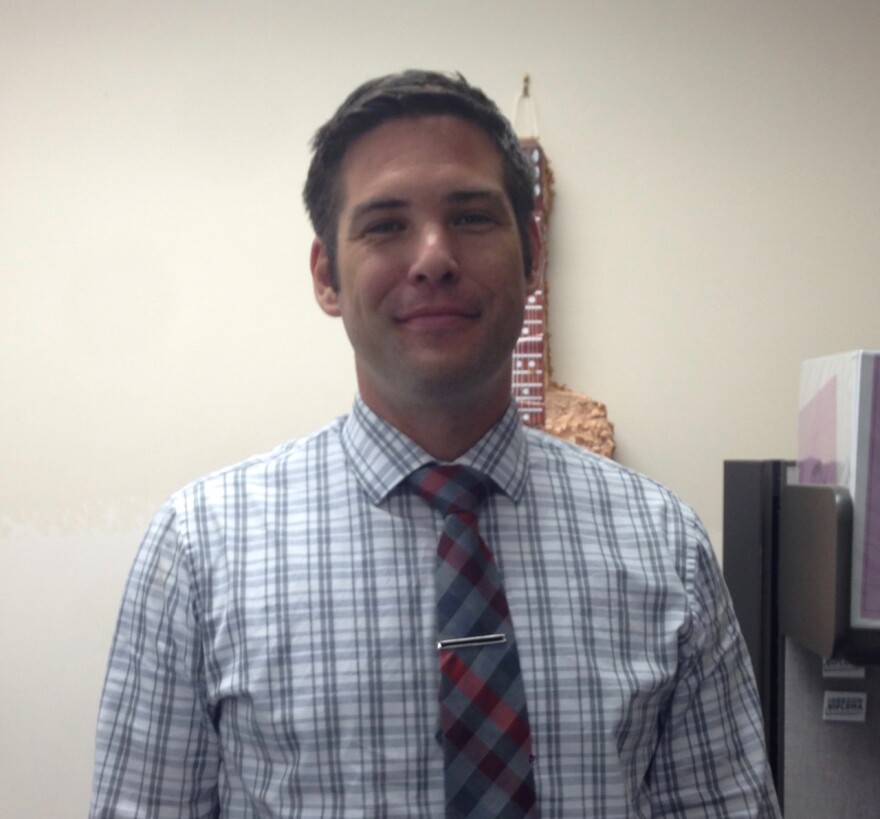It takes only a moment to sign a major bill into law. It will take years to implement a new Federal education policy. Oregon educators look forward to the possible impacts of the Every Student Succeeds Act.
[whistle and huddle break]
Classes won't start for a couple weeks, but the McKenzie High School football team has practice, and it's day one for administrators across the state.

Tompkins: “I'm Lane Tompkins, I'm the K-12 Principal of McKenzie Schools. I'm a graduate from the class of 2000 and then my mom was a 1972 graduate.”
This is Tompkins' third year as principal. The school, up the McKenzie River east of Eugene, is 75 years old and has plenty of extra room. Like many Oregon timber communities, droves of families moved out in the 80's and 90's as lumber jobs disappeared. Now there are around 180 students across 12 grades. Tompkins says one of the biggest challenges of the No Child Left Behind Act (NCLB) was hiring staff to meet its standards.
Tompkins: “We're so small that, an example was, for science, it's really hard to find somebody to be our science department, because it's not just a general science endorsement.”
Under NCLB, Tompkins needed one teacher “highly qualified” and endorsed in Biology, Chemistry and Physical Science. Help may be on the way. President Obama signed the Every Student Succeeds Act, or ESSA, last December. It requires the states to craft their own rules.

Boyd: “The biggest transition is the elimination of the Highly Qualified requirements.”
Tim Boyd works on school effectiveness at the Oregon Department of Education. He says the state is working hard to make a plan for teacher qualifications that works for small communities like McKenzie as well as big-city districts.
The ODE held public meetings last spring and summer asking what makes an ideal school. This fall, they're analyzing the feedback. Derek Brown's focus is on Assessment and Accountability. He says people were strongly against having summative, or broad year-end assessments like the Smarter Balanced tests factor into teacher evaluations, as is the current policy.

Brown: “The recommendations coming out of the workgroups and some of the other themes that we've heard from the forums, are moving that from a shall to a may, that it wouldn't be required, but it would be optional.”
Vaandering: “We know that there is no research that shows that summative assessments being used to evaluate teachers is an effective way to do so.”
Hanna Vaandering is president of the Oregon Education Association, the state's largest teacher's union. She points to Senate Bill 290 as a model. The 2011 state law requires multiple measures of teacher evaluation, including student assessments. However, those assessments may include classwork, or data other than standardized tests.
Principal Tompkins has been happy with SB290, which remains in effect. It's required him to check in on his staff more often:
Tompkins: “Now we're mandated to do the things that good administrators and teachers should be doing, meeting and talking. Most of the time those conversations are a lot of fun.”

He says it's rewarding to review student progress throughout the year. Yet it's sometimes hard to keep up with the ever-changing requirements and paperwork landing on his desk.
Tompkins: “One of the things that, with education that can get frustrating is, we try something for a while, and then, four or five years in, we're 'now let's do something totally different.' We're not actually able to see how it plays out, long term.”
Rolling out new rules can take years. This fall, the Feds will continue to tweak last year's law. Oregon won't submit its plan until spring. Implementation begins next school year. Tompkins isn't waiting to see if ESSA will give his district more flexibility in hiring:
Tompkins: “We'll be presenting our proposal for our charter at this next board meeting. So I think going charter would really open us up to be able to offer more things to our students.”
He says being a charter school would also enable them to bring in students from outside district boundaries. It might even encourage more people to move to the community.
Leif Gustavson is Dean of the College of Education at Pacific University. He feels it's important to create a sustainable teaching workforce:
Gustavson: “We can't look at public education like a business. It requires different ways of thinking. It is an essential fabric within our society that does not bend and shift with the whims of the economy.”
Gustavson thinks this transition time offers an opportunity if all stakeholders, including Oregon's teacher prep programs, are included in the conversation.
Gustavson: “I really feel like we can do this and we can be a model for the country.”
OEA's Hanna Vaandering shares his enthusiasm.
Vaandering: “We have underfunded public education in Oregon for far too long. But we have the opportunity right now of a lifetime.”
Derek Brown at ODE agrees the state's collaboration with unions, teachers, and parents is unique. He says it's hard work, but it's the right work. For Oregon's schools and classrooms, the fruits of that labor can't come soon enough.






